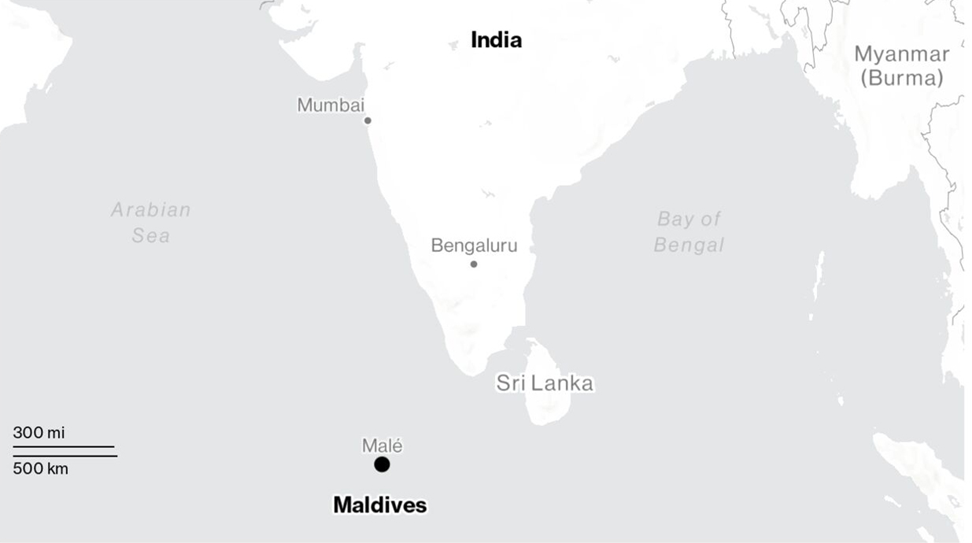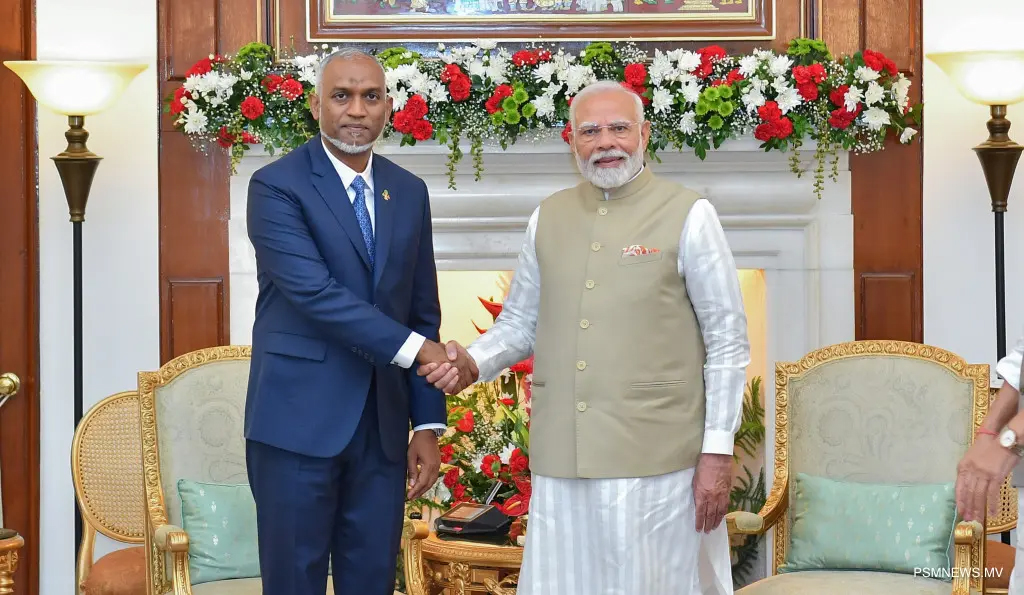Context:
The recent visit of Maldivian President Mohamed Muizzu to India marked a significant development in the bilateral relations between India and the Maldives. The discussions and agreements reached during this visit aimed at resolving the Maldives' growing economic crisis, while also focusing on strengthening maritime security, economic ties, and diplomatic cooperation.
Overview of Currency Swap Agreements:
- Maldives is grappling with an escalating external debt crisis, worsened by low foreign reserves and upcoming debt repayment deadlines.
- Currency Swap Deals:
- Two currency swap deals worth $760 million were signed between India and the Maldives during Muizzu’s visit.
- The deals include a $360 million currency swap in Indian Rupees and a $400 million agreement in US dollars.
- These deals will provide immediate relief to Maldives’ foreign exchange reserves, helping the country manage its international obligations and imports.
What are Currency Swap Agreements?
· A currency swap is when two people or businesses exchange equal amounts of money in two different currencies. They agree to give the money back to each other on a specific date in the future.
· These swaps work a bit like loans, where both sides pay interest on the money they exchanged. However, unlike regular trades that happen on public markets, currency swaps happen directly between the two parties (called over-the-counter or OTC), not through a formal exchange or platform.
· In simple terms, it's a private agreement where both sides benefit from trading and borrowing each other’s money.
· In India, the Commerce Ministry has established arrangements with 23 countries for local currency trade, including nations like Angola, Algeria, Nigeria, Iran, Iraq, Oman, Saudi Arabia, Yemen, Japan, and Russia.
Maldives' Economic Challenges and Debt Crisis
- Economic Dependency on Tourism:
- The Maldivian economy is heavily dependent on tourism, which was severely affected by the COVID-19 pandemic. Although tourism has rebounded, revenues remain low due to shorter stays and reduced spending by tourists.
- Foreign Reserves:
- As of September 2024, the Maldives' foreign reserves stood at a precarious $371.22 million, barely sufficient to cover 1.5 months of imports.
- The nation is expected to service nearly $110 million in external debt this quarter alone, with debt servicing rising to $557 million in 2025 and exceeding $1 billion by 2026.
- Ratings Downgrades:
- Due to the mounting debt and declining reserves, international credit rating agencies like Fitch and Moody’s have downgraded the Maldives' debt ratings, intensifying the country's financial vulnerability.

Diplomatic Relations between India and Maldives:
- Shift in Diplomatic Stance:
- Muizzu’s initial campaign was marked by an anti-India stance, with calls to remove Indian troops stationed in the Maldives and criticisms of dependency on India for essential goods.
- After assuming office, Muizzu requested the removal of Indian troops stationed in the Maldives to operate search-and-rescue aircraft.
- Reconciliation and Strengthening of Ties:
- Despite the early tensions, Muizzu's government has sought to repair relations with India. The signing of the currency swap agreements signals a reconciliation process, reflecting the importance of India as a strategic and economic partner for the Maldives.
- The renewal of essential goods quotas and multiple diplomatic visits from both sides have further stabilized bilateral relations.
Bilateral Cooperation in Maritime Security:
- Maritime and Defence Cooperation:
- Maritime security and defence ties between India and Maldives have been central to their relationship, especially given the strategic importance of the Indian Ocean region.
- During the visit, both nations discussed enhancing cooperation on issues such as terrorism, drug trafficking, and illegal fishing.
- The Indian Navy has been instrumental in supporting the Maldives' Coast Guard by donating vessels and assisting with their maintenance.
- Coast Guard Support:
- India agreed to repair and refit a Maldivian coast guard ship donated earlier by New Delhi, further solidifying defence cooperation.
- Hydrography Agreement:
- Although Maldives had previously opted out of a bilateral hydrography agreement with India, discussions during the visit highlighted the need for continued capacity-building in this area. India remains committed to assisting the Maldives in this field.
India's Role in the Maldives' Economic Recovery:
- Further Assistance on the Horizon:
- In addition to the currency swap agreements, the Maldives has requested further assistance from India to stabilize its economy. Discussions on additional measures are ongoing, with both nations emphasizing economic resilience and stability.
- Treasury Bill Roll-over: Earlier this year, India agreed to roll over $100 million worth of Treasury bills subscribed by the State Bank of India, giving the Maldives much-needed financial relief.
- Maldives recently made a $25 million Sukuk payment, avoiding default, with India playing a critical role in providing financial assistance.
- Potential Free Trade Agreement:
- During the talks, both nations agreed to initiate discussions on a bilateral Free Trade Agreement (FTA), which could further enhance economic cooperation.
Tourism and RuPay Launch:
- Promotion of Indian Tourism:
- India had been a major source of tourists for the Maldives post-pandemic, although numbers have decreased recently. China, Russia, and Italy have since emerged as the top sources of tourists.
- President Muizzu has called for an increase in Indian tourists, recognizing the importance of tourism in boosting the Maldivian economy.
- RuPay Card Launch:
- The launch of the RuPay card in the Maldives is expected to facilitate smoother financial transactions for Indian tourists, thus promoting tourism.
Opposition Criticism and Domestic Reactions:
- Muizzu’s cooperation with India has sparked criticism from opposition leaders in the Maldives, many of whom accuse him of a "U-turn" on his previous anti-India stance.
- Opposition figures have also voiced concerns over the continued defence cooperation with India, particularly in relation to projects like the UTF Coast Guard port and the proposed Indian consulate in Addu. They argue that these projects were previously portrayed as a colonization plan by the ruling coalition.
Conclusion:
The visit of President Muizzu to India has marked a turning point in the diplomatic relations between the two nations. Despite initial tensions, the discussions during Muizzu’s visit emphasized the need for continued close cooperation between India and the Maldives on security challenges in the Indian Ocean region. As the Maldives continues to grapple with economic challenges, India's role as a key ally will be critical in ensuring the island nation's long-term stability and growth.
Source: The Hindu
|
Probable questions for UPSC mains examination: Examine the role of India as a development partner for the Maldives. How does India’s economic and security assistance shape the regional dynamics in South Asia? |








